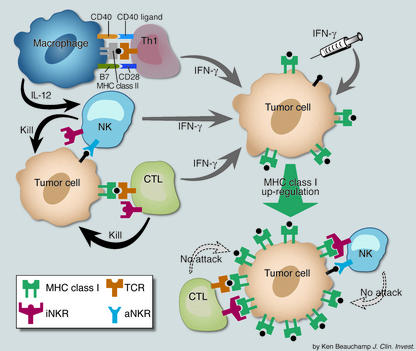Figure 1.
Model for IFN-γ–mediated inhibition of NKs and anti-tumor CTLs. Tumor-infiltrating macrophages present MHC class II:tumor peptide ligands to antigen-specific Th1 cells and induce them to produce IFN-γ. In addition, by upregulating CD40 ligand, these activated Th1 cells ligate CD40 receptors on the macrophages and induce them to secrete IL-12; IL-12 then triggers IFN-γ production by NKs. Low MHC class I–expressing tumor cells also activate high-avidity tumor-specific CTLs and NKs (unengaged iNKRs + activated aNKRs) to produce IFN-γ. By upregulating classical and nonclassical MHC class I surface expression by tumor cells, IFN-γ, either endogenously produced or injected, promotes activation of iNKRs on NKs and anti-tumor CTLs and turns off their cytotoxic effector function.

